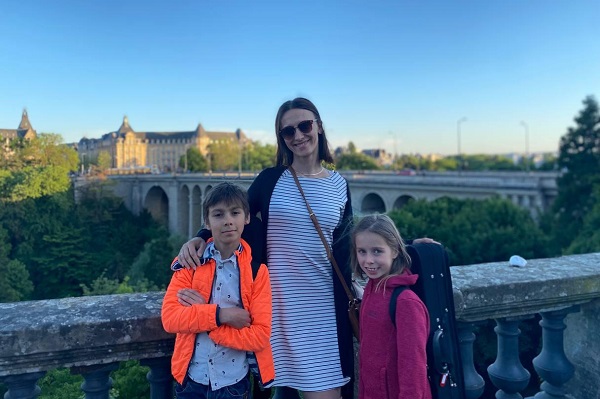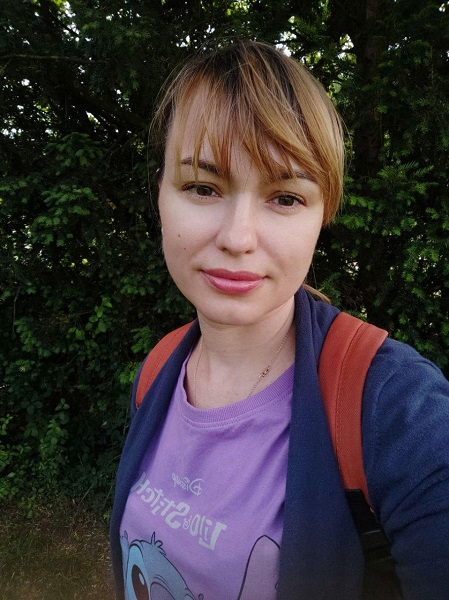 (Above) Olena Shevchenko with her two children; (below) Nataliia Korostashova;
(Above) Olena Shevchenko with her two children; (below) Nataliia Korostashova;
Chronicle.lu recently sat down with Olena Shevchenko and Nataliia Korostashova, two Ukrainain women who, together with their children, have sought refuge in Luxembourg following the Russian invasion of their homeland which began on 24 February 2022.
This article is part of a series of human-centred stories about Ukrainian refugees in Luxembourg. This series stems from the positive reaction to Chronicle.lu's recent story about a ballroom dancing refugee couple from Ukraine.
Olena Shevchenko, who had her own business linked to child development back in Ukraine, arrived in Luxembourg with her two children (aged eight and six) and their dog on 10 March 2022. One month later, she was joined by her friend Nataliia Korostashova and her two children (aged eight and four) in the Grand Duchy. In this interview on Chronicle.lu, the two women share their experiences of fleeing Ukraine and creating a new life as beneficiaries of temporary protection in the Grand Duchy.
Waking up to bombs
Olena explained how she had woken up to the sounds of bombs on 24 February and quickly decided she had to leave the country with her children. “We had an emergency bag ready to run very fast”, she explained. Within one hour, she, her husband, their children and dog were in their car and set off from Kyiv towards the border with Slovakia. Whilst the journey normally takes about twelve hours, it took them some 36 hours to get to the border. “The petrol stations were full of cars. There was a limit of 20 litres of fuel per car and two hours for each patrol”, Olena recalled, adding that there had been an explosion near them, and her son had a fever. “It was a very stressful situation”, she noted. “The children were counting how many Ukrainian tanks were going by [towards Kyiv]”. Once they arrived in Slovakia, Olena and the children continued on their journey, whilst her husband remained in Ukraine.
Having crossed the border, “you felt safety, but you felt completely empty”, recalled Olena. “You have nothing, no plan. Everything happened so fast”, she continued. “No one believed this could happen in the 21st century. It was a shock for everyone”. In the nearest city in Slovakia, Olena and her children spent the first night in a hotel. She recalled putting her children to bed and then, when she was sure they were asleep, locking herself in the bathroom to cry. In the morning she “put [her]self together and thought about what to do next”. They stayed in hotels for a few more nights before being taken in by a Slovakian family for two weeks. She described their kindness – and that of others they met along the way – as an “amazing experience”, adding that this contrasted starkly with the “terrible pain” associated with the Russian invasion. “People who you thought were you brothers [try to] kill you”, she said. “Other people help and give you support”.
Nataliia and her family initially stayed in Ukraine. She recalled her husband waking her up on the morning of 24 February, saying that the war had begun. “Nobody believed a war would start”, she told Chronicle.lu. “It was very scary. We panicked, we did not know what to do, we were not ready”. They hoped to escape the bombs by fleeing to the Carpathian Mountains, where their friends lived, and so, with the remote guidance of a friend in Canada, Nataliia and her family drove away from Kyiv, trying to avoid being shot at, towards the mountains. They stayed in temporary accommodation there for two and a half months, until “finally Russia bombed everywhere”. Nataliia continued: “There was no place to hide”. All the while, she remained in contact with Olena, who had already arrived in Luxembourg. When it became clear that there was “no safe place” and her children could no longer live a normal life in Ukraine, Nataliia took the difficult decision to leave the country. Olena suggested she come to Luxembourg and persuaded her hesitant friend that she was making the right decision to leave. As in the case of Olena, Nataliia’s husband stayed behind in Ukraine.
Uncertainty mixed with a warm Luxembourg welcome
For Olena, the feeling of uncertainty has been one of the most difficult parts of this whole experience. She recalled calling a friend in Belgium for advice and the friend told her about volunteers supporting Ukrainian refugees in Luxembourg. The possibility of free accommodation for refugees, in a country known for its expensive housing, and the fact that she spoke English and French made Luxembourg a promising option. And so, having only ever visited the country once before, Olena packed up her family’s things and she and her children embarked on the over 1,000-kilometre journey by car to the Grand Duchy. “We knew no one here”, Olena said, adding that she had been “amazed by the people who accepted us. They brought us water, shampoos, the little things but this was so important”. She quickly made a new friend in Luxembourg who agreed to accommodate her and her children. However, the first months in Luxembourg were characterised by “emptiness”. Olena elaborated: “Before the war, I loved to travel a lot, to see the world. It’s not the same now because we were forced to leave our country, our home”. She added that it has been a situation of “constant stress” and mentioned survivors’ guilt. “It is the first time I feel nostalgic for my country”, she said, recalling how she had had to leave behind her friends and family, her business, her newly constructed house and her homeland because of the war.
Upon her arrival in Luxembourg in March 2022, Olena has been very active in supporting fellow Ukrainian refugees. “In two weeks, I knew a lot of volunteers and organisations and helped people get accommodation”, she explained; this included helping Nataliia and her children find a place to stay. Olena added that she had helped organise meetings for newly arrived Ukrainians in Luxembourg. Organising activities helped her “feel like [she] was doing something to help them” and was part of her “personal responsibility” to support other Ukrainians. She also began collecting and donating money to the Ukrainian army, specifically to a brigade of ten soldiers. She has since sent two cars to the armed forces (one she bought with the money raised and another was her own which she donated to them), as well as helmets and medical equipment. A paramedic here in Luxembourg called Sonja was offering first aid courses and has been helping Olena collect the necessary equipment. “I cannot save everybody but know that these people are under my protection”, Olena commented. She has also been organising free lessons for Ukrainian children in Luxembourg. “We tried to give the same life to kids and avoid stress [for them]”, she explained. “These children will help rebuild the future”.
Nataliia and her children arrived in Luxembourg via Poland in April 2022. Like Olena, Nataliia was grateful for the support they had received in the Grand Duchy. “Luxembourgish people support a lot. Everybody does some small things, like bringing cake, saying hello or bringing toys for children”, she explained. “It helped us feel not alone in this terrible situation”. Olena agreed, saying how she had been impressed by “the willingness of people [in Luxembourg] to support others”. Nevertheless, the transition to a new life was difficult, as Nataliia explained: “It is something you need to create from zero. You have been forced to leave your country”. She recalled that this was the first time she had acted alone, without the guidance of her husband. She also explained that she has begun learning French since moving to Luxembourg and is motivated to learn new things.
Both Olena and Nataliia noted that their children were settling well into their new lives in Luxembourg. They agreed that seeing their children happy helped them get through this difficult situation. Nataliia added that she had been pleasantly surprised by how empathetic even the children in Luxembourg had been.
Broken families
Returning to the situation in Ukraine, Olena noted that the war had broken up families on both sides of the border. She recalled that many Ukrainians had family in Russia and vice versa. However, she had heard stories of people in Russia not believing their Ukrainian relatives about the extent (or even the existence) of the war. “A lot of families just broke”, she said. Olena went on to compare her fellow Ukrainians to bees: “They are hardworking and calm but if you hit their hive, they will fight to defend it”. She expressed her pride in the Ukrainian soldiers who remained behind to defend and rebuild their country. Conversely, she harboured resentment towards Russia because of the invasion, noting that the war had altered her perception of the Russian people, who were once considered "brothers", and arguing that if Ukraine fails in its mission of stopping Russian forces, they will push further into Europe.
Looking forward
Reflecting once again on their experiences in the Grand Duchy, both Olena and Nataliia expressed their gratitude to Luxembourg and its people for their support. Olena elaborated: “I hope when [the war] finishes, we can invite everyone who helped us here to Ukraine”. Whilst she recognised that a significant amount of work will be needed to rebuild Ukraine after the war, she recalled that buildings can be replaced but the lost lives cannot. Nataliia, like many Ukrainian refugees in Luxembourg, hopes to return to Ukraine one day: “I hope that it will come to an end soon and peace will come”.









